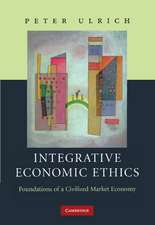Commentary on Thomas Aquinas's Virtue Ethics
Autor J. Budziszewskien Limba Engleză Paperback – 21 noi 2018
| Toate formatele și edițiile | Preț | Express |
|---|---|---|
| Paperback (1) | 227.12 lei 6-8 săpt. | |
| Cambridge University Press – 21 noi 2018 | 227.12 lei 6-8 săpt. | |
| Hardback (1) | 514.58 lei 6-8 săpt. | |
| Cambridge University Press – 3 mai 2017 | 514.58 lei 6-8 săpt. |
Preț: 227.12 lei
Nou
Puncte Express: 341
Preț estimativ în valută:
43.46€ • 45.50$ • 35.96£
43.46€ • 45.50$ • 35.96£
Carte tipărită la comandă
Livrare economică 05-19 aprilie
Preluare comenzi: 021 569.72.76
Specificații
ISBN-13: 9781316617113
ISBN-10: 1316617114
Pagini: 323
Ilustrații: 1 b/w illus.
Dimensiuni: 150 x 228 x 19 mm
Greutate: 0.48 kg
Editura: Cambridge University Press
Colecția Cambridge University Press
Locul publicării:New York, United States
ISBN-10: 1316617114
Pagini: 323
Ilustrații: 1 b/w illus.
Dimensiuni: 150 x 228 x 19 mm
Greutate: 0.48 kg
Editura: Cambridge University Press
Colecția Cambridge University Press
Locul publicării:New York, United States
Cuprins
Acknowledgments; Ante Studium; Introduction; Part I. Moral Character in General: Commentary on I-II, Question 55, Article 4: whether virtue is suitably defined?; Commentary on I-II, Question 58, Article 4: whether there can be moral without intellectual virtue?; Commentary on I-II, Question 58, Article 5: whether there can be intellectual without moral virtue?; Commentary on I-II, Question 61, Article 2: whether there are four cardinal virtues?; Commentary on I-II, Question 61, Article 3: whether any other virtues should be called principal rather than these?; Commentary on I-II, Question 62, Article 1: whether there are any theological virtues?; Commentary on I-II, Question 63, Article 1: whether virtue is in us by nature?; Commentary on I-II, Question 63, Article 2: whether any virtue is caused in us by habituation?; Commentary on I-II, Question 65, Article 1: whether the moral virtues are connected with each other?; Commentary on I-II, Question 84, Article 4: whether the seven capital vices are suitably reckoned?; Part II. The Virtue of Justice, Especially in Relation to Law: Commentary on II-II, Question 30, Article 3: whether mercy is a virtue?; Commentary on II-II, Question 58, Article 1: whether justice is fittingly defined as being the perpetual and constant will to render to each one his right?; Commentary on II-II, Question 60, Article 1: whether judgment is an act of justice?; Commentary on II-II, Question 60, Article 2: whether it is lawful to judge?; Commentary on II-II, Question 60, Article 5: whether we should always judge according to the written law?; Commentary on II-II, Question 60, Article 6: whether judgment is rendered perverse by being usurped?; Commentary on II-II, Question 80, Article 1: whether the virtues annexed to justice are suitably enumerated?; Commentary on II-II, Question 122, Article 1: whether the precepts of the Decalogue are precepts of justice?; Index.
Notă biografică
Descriere
This guide to St Thomas Aquinas' virtue ethics provides commentary on essential texts, rendering them accessible to all readers.















